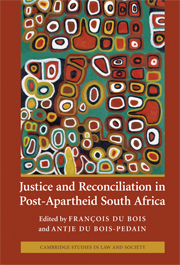Book contents
- Frontmatter
- Contents
- List of tables and figures
- List of contributors
- Acknowledgements
- List of abbreviations
- Introduction
- 1 Reconciliation as surrender: configurations of responsibility and memory
- 2 Radical forgiveness: transforming traumatic memory beyond Hannah Arendt
- 3 Communicating criminal and political responsibility in the TRC process
- 4 The contribution of criminal justice
- 5 Reparation and the forms of justice
- 6 Land restitution and reconciliation in South Africa
- 7 For justice and reconciliation to come: the TRC archive, big business and the demand for material reparations
- 8 Transition, forgiveness and citizenship: the TRC and the social construction of forgiveness
- 9 The evolving legitimacy of the South African Constitutional Court
- 10 Drawing the line: justice and the art of reconciliation
- 11 Post-conflict justice and the reconciliatory paradigm: the South African experience
- Index
- References
9 - The evolving legitimacy of the South African Constitutional Court
Published online by Cambridge University Press: 01 July 2009
- Frontmatter
- Contents
- List of tables and figures
- List of contributors
- Acknowledgements
- List of abbreviations
- Introduction
- 1 Reconciliation as surrender: configurations of responsibility and memory
- 2 Radical forgiveness: transforming traumatic memory beyond Hannah Arendt
- 3 Communicating criminal and political responsibility in the TRC process
- 4 The contribution of criminal justice
- 5 Reparation and the forms of justice
- 6 Land restitution and reconciliation in South Africa
- 7 For justice and reconciliation to come: the TRC archive, big business and the demand for material reparations
- 8 Transition, forgiveness and citizenship: the TRC and the social construction of forgiveness
- 9 The evolving legitimacy of the South African Constitutional Court
- 10 Drawing the line: justice and the art of reconciliation
- 11 Post-conflict justice and the reconciliatory paradigm: the South African experience
- Index
- References
Summary
INTRODUCTION
A crucial task for courts in transitional political systems is to establish institutional legitimacy. Without legitimacy and absent the proverbial powers of the purse and the sword, courts are dependent upon satisfying their constituents in order to gain compliance with (or acceptance of) their decisions. But no political institution can unerringly please its constituents. In order for courts to be relied upon to check the power of the governing majority, some mechanism must insulate judicial institutions from the displeasure of that majority (the so-called counter-majoritarian dilemma). Developing legitimacy – the belief that the institution has the right, or moral authority to make decisions – is essential if courts are to perform the role assigned to them by democratic theory.
Consequently, political scientists have examined the stores of legitimacy of courts throughout the world. The South African Constitutional Court in particular has been the object of considerable study, in part because South Africa faces difficult problems of reconciling vast majority power with the rights of political, racial and ethnic minorities. If South Africa is not to go the way of Africa's many illiberal democracies, then some institution must tame the will of the majority. Whether the Constitutional Court, itself a creature of the transition to democracy, is capable of performing such a function is a question of fundamental importance for South Africa's future political stability.
This chapter examines developments in the legitimacy of the South African Constitutional Court over the period from 1997 to 2004.
- Type
- Chapter
- Information
- Justice and Reconciliation in Post-Apartheid South Africa , pp. 229 - 266Publisher: Cambridge University PressPrint publication year: 2009
References
- 3
- Cited by



